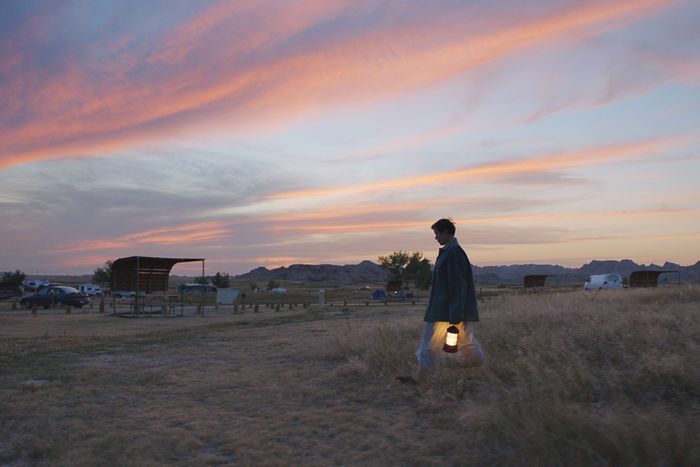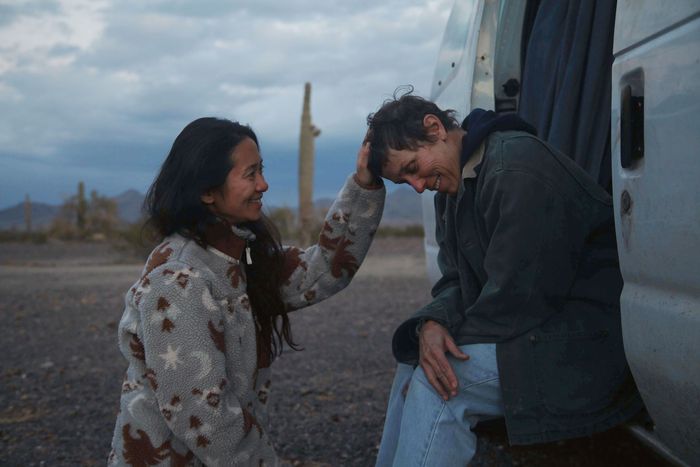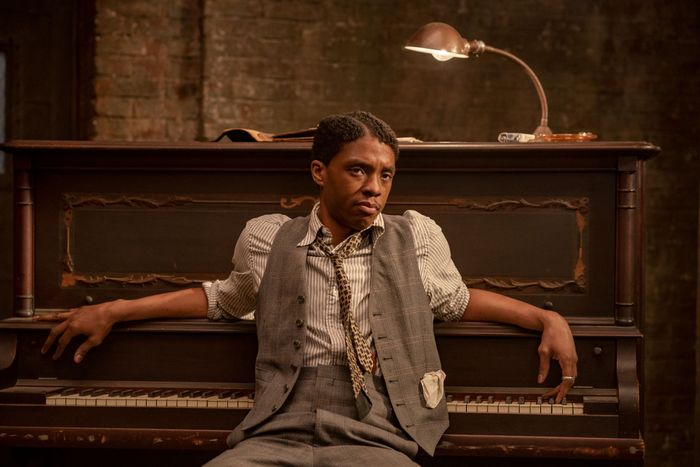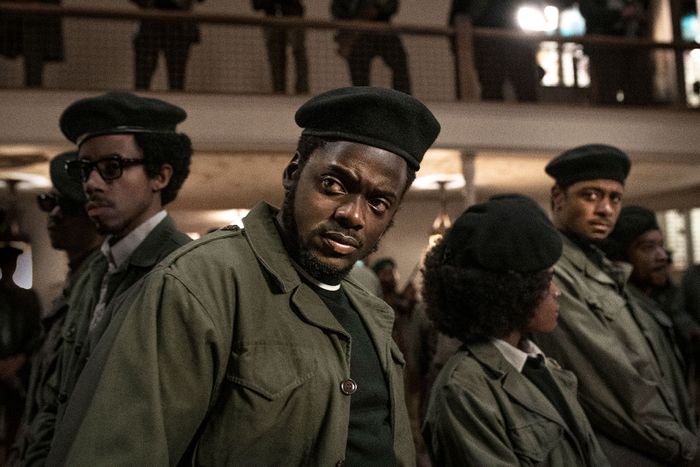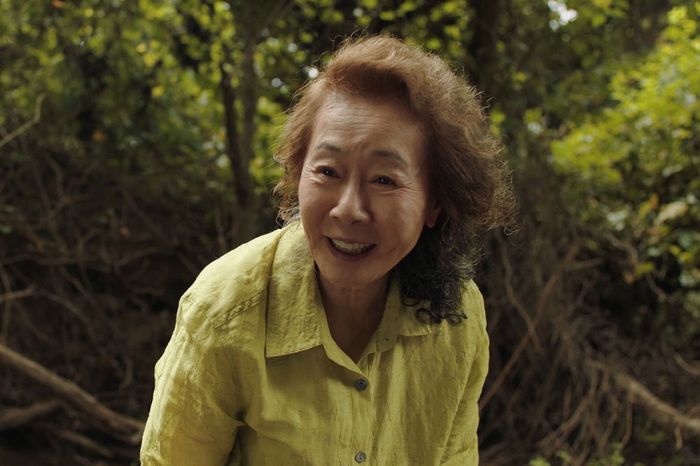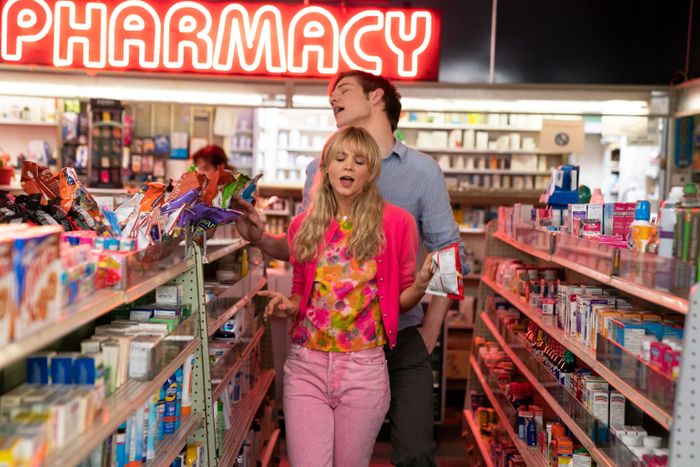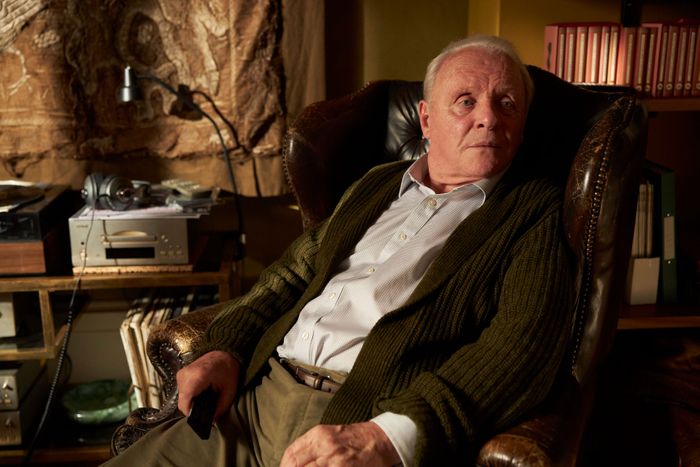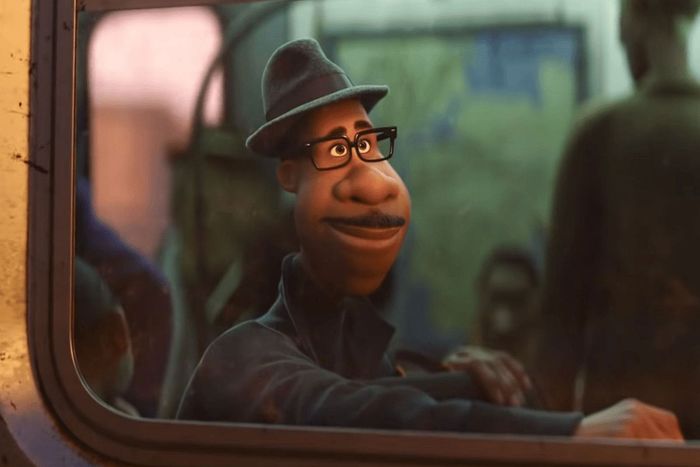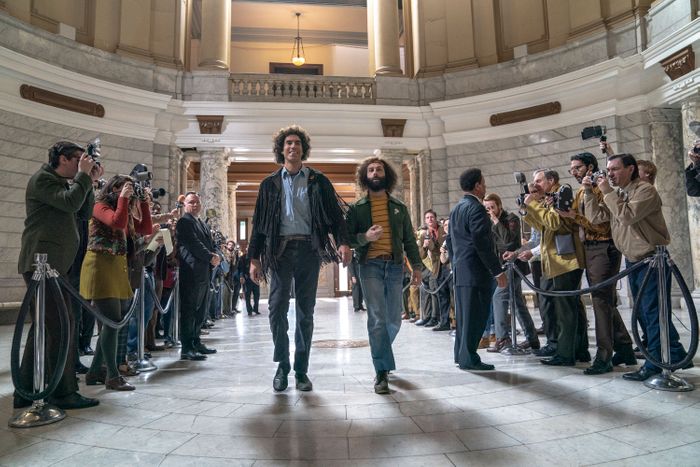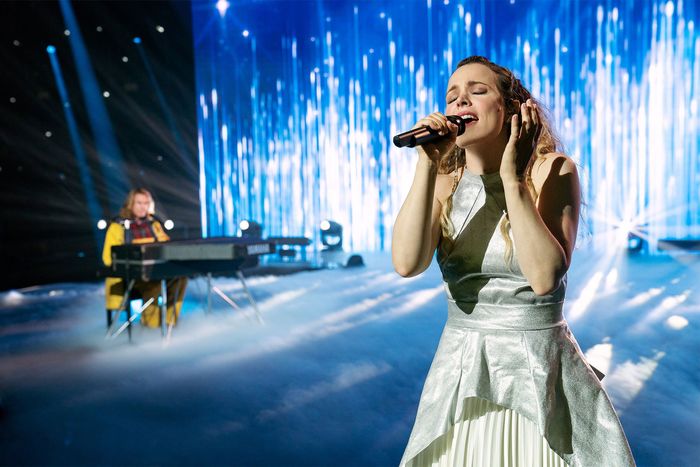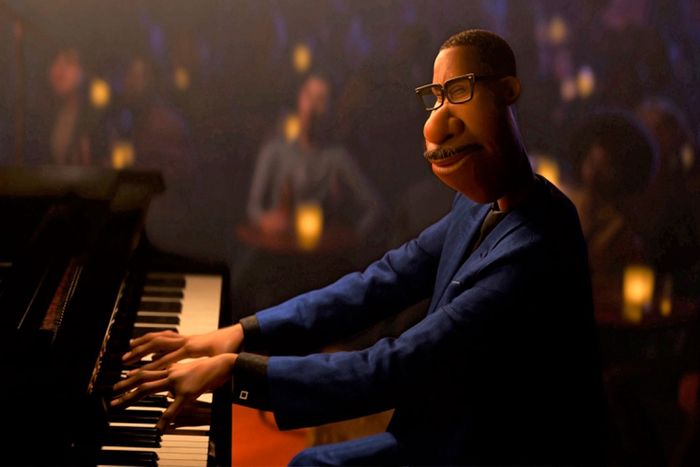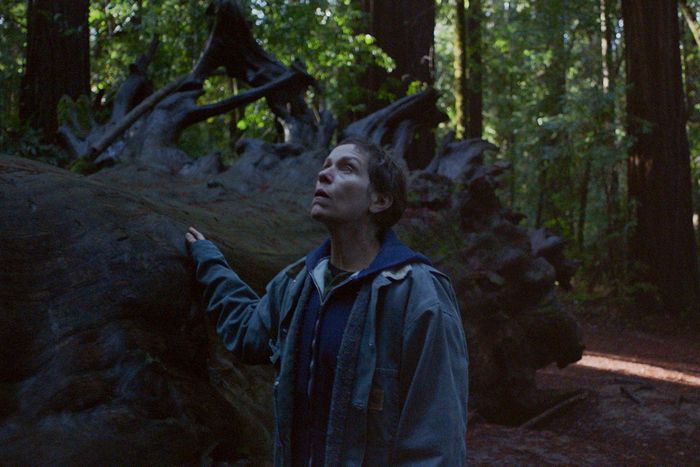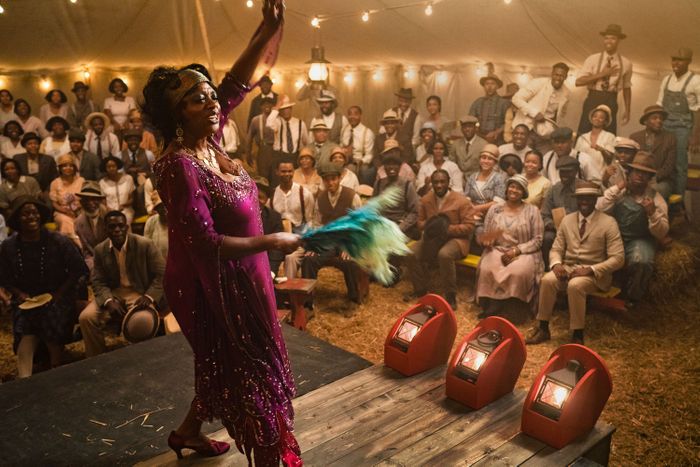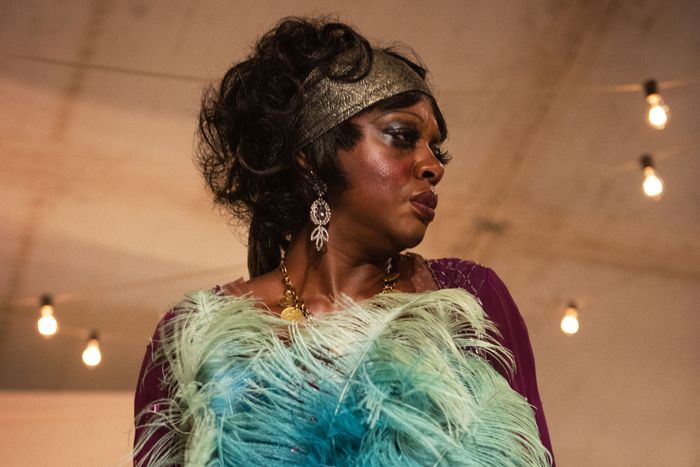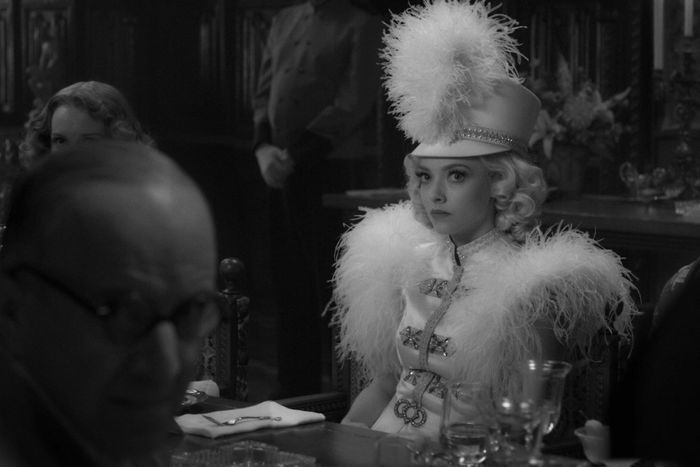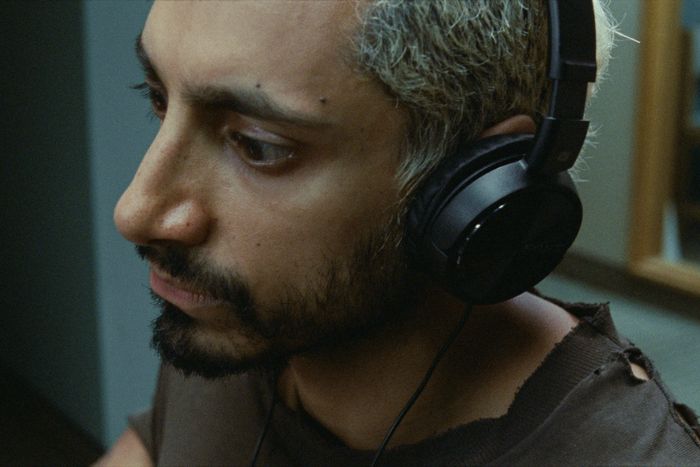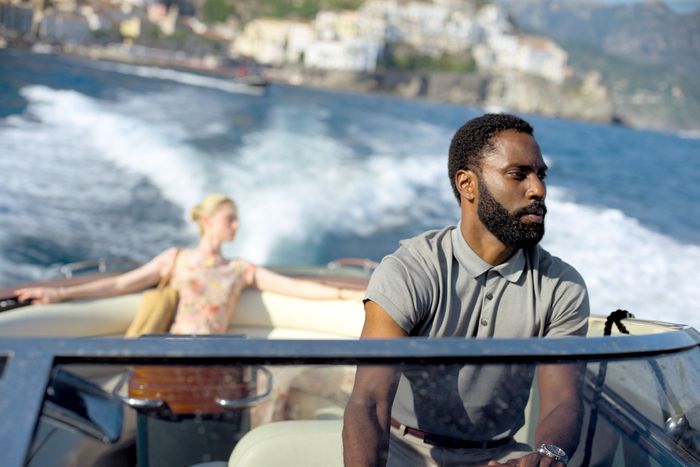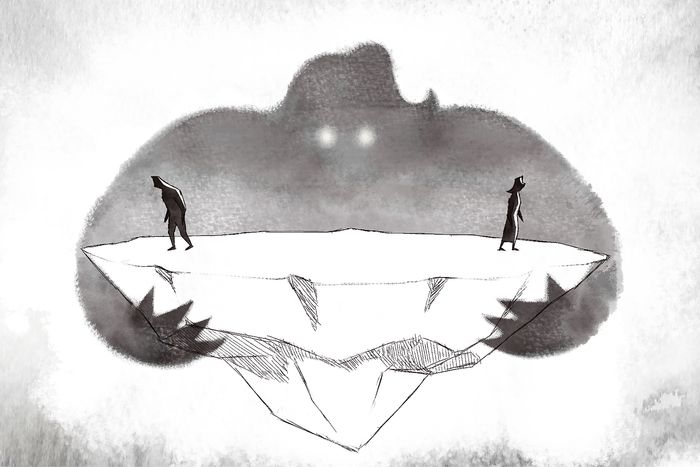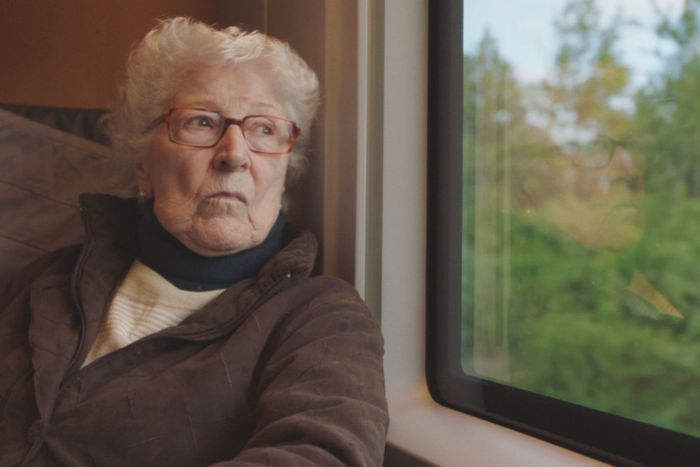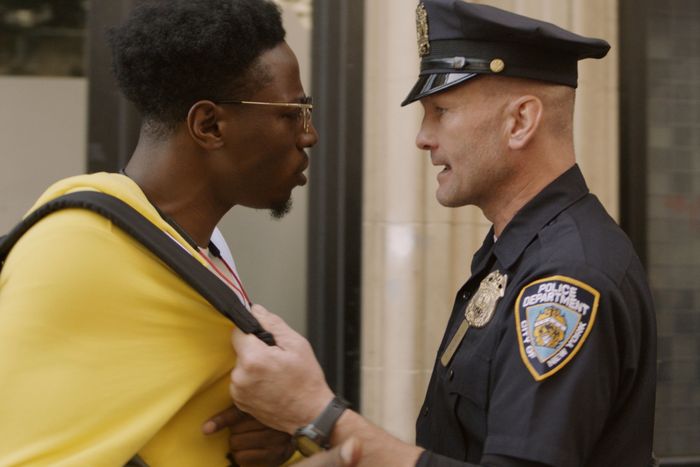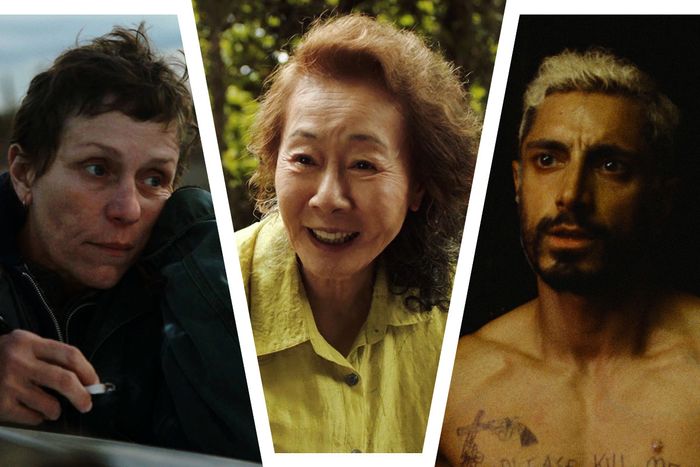
How long has this Oscar season lasted? When Parasite won Best Picture last February, the United States was still in the last few weeks of blissful pre-pandemic ignorance. (Of course, like most lost golden ages, it did not exactly feel that way at the time.) When the Academy pushed back the date of the 2021 ceremony last June, there was still hope that the world might be back to normal by the end of the year. When Nomadland debuted at the Venice Film Festival, the presidential election was still two months away. Now, we’re finally at an end, if not the end: The 93rd Academy Awards are this Sunday, and as this post hits the Vulture homepage, your Oscar Futures correspondent will have just received his second vaccine dose.
This has been a strange Oscar year, to say the least, with most of the hallmarks of the season absent. No reports from rapturous festival screenings, no in-person charm offenses from ambitious A-listers, no box-office figures to separate the flops from the smashes. (Mercifully, there seems to have been less behind-the-scenes skulduggery, too.) But while the lack of theatrical screenings undoubtedly dimmed the luster of this year’s field, there was one small silver lining: With the Academy opening up its rule book to accommodate streaming and VOD releases, many of the nominees were more accessible than ever before.
I’ve heard some Academy members speculate that, with so many films fleeing the field, this season will carry an asterisk. That may be so. But it also made for a crop of nominees that felt fresher and more exciting than they have in years. Will that hold true for the winners as well? Let’s run down each of the 24 23 categories and see.
Best Picture
The Father
Judas and the Black Messiah
Mank
Minari
Nomadland
Promising Young Woman
Sound of Metal
The Trial of the Chicago 7
With no big-budget blockbusters in the mix this year, our eight Best Picture nominees are mostly smaller films that resonate on the frequency of this turbulent year. Chicago 7 and Black Messiah follow ’60s radicals strategizing about the most effective ways to shake up a corrupt system. Minari spotlights working-class Korean immigrants at a time when those communities are under threat. Promising Young Woman is a one-woman vigilante campaign against rape culture, while Mank places the inspiration for Citizen Kane in a “Big Lie” spread through conservative media. Even the relatively apolitical Sound of Metal and The Father work as metaphors for the dislocation of daily life in the COVID era, the sudden disruption of everything you thought you knew.
Plot-wise, Nomadland is less ultratimely than some of its competition — it’s set amid the wreckage of the financial crisis, the last society-shattering calamity — but emotionally, nothing in this year’s field feels more 2020. This a movie about what happens after the world ends, about finding meaning in whatever scraps of experience you can. In a more conventional year, it might have been overshadowed by larger, louder contenders. This year, it’s the front-runner for a reason. Chloé Zhao’s film has taken home almost every major precursor, and I do not foresee that trend changing Sunday night. The only question is how many other trophies will it win?
Best Director
Lee Isaac Chung, Minari
Emerald Fennell, Promising Young Woman
David Fincher, Mank
Thomas Vinterberg, Another Round
Chloé Zhao, Nomadland
Let’s start with this one. There’s a slight backhanded quality to the way some pundits talk about Chloé Zhao, as if she’s only the front-runner because, after last year’s controversy, the Academy needed a female filmmaker to anoint. That’s unfair. Why not see her as this year’s Damien Chazelle, an indie wunderkind rewarded for honing her aesthetic obsessions into a major Best Picture contender? (And who afterward went to space.) But no matter which way you look at it, Zhao comes into the Oscars having won nearly every other Best Director prize this year. She’s the lockiest lock of the night.
Best Actor
Riz Ahmed, Sound of Metal
Chadwick Boseman, Ma Rainey’s Black Bottom
Anthony Hopkins, The Father
Gary Oldman, Mank
Steven Yeun, Minari
Hopkins’s BAFTA win injected a little late suspense into what had otherwise been our most predictable acting race. But only a little — I still expect the Academy to embrace the symbolism of recognizing the beloved Chadwick Boseman for his final performance.
Best Actress
Viola Davis, Ma Rainey’s Black Bottom
Andra Day, The United States vs. Billie Holiday
Vanessa Kirby, Pieces of a Woman
Frances McDormand, Nomadland
Carey Mulligan, Promising Young Woman
No category was easier to predict nomination morning; no category is harder to predict now. Each major precursor was won by a different actress, and with the exception of Kirby, who’s just happy to be there, each nominee has a plausible case for the Oscar. For much of the season, I felt this was Mulligan’s to lose. She’s the lead in a much-loved Best Picture nominee, going up against two previous winners and two Oscar newbies. But she’s underperformed at the precursors, including a baffling snub by the BAFTA’s new jury system. (That jury also snubbed Day and Davis, depriving us the chance to see which way the Brits would have leaned if everyone was available.) Day has the most awards-friendly role but is repping a film with no other nominations. Davis has SAG on her side, and you can make a case that she’s overdue for a Lead Actress win. But I keep coming back to Frances McDormand, whose openness and curiosity is evident in every frame of her film. Yes, she’s already won two Oscars (the last fairly recently), but in so many ways, her performance *is* Nomadland. Make it three for the Best Picture front-runner.
Best Supporting Actor
Sacha Baron Cohen, The Trial of the Chicago 7
Daniel Kaluuya, Judas and the Black Messiah
Leslie Odom Jr., One Night in Miami
Paul Raci, Sound of Metal
Lakeith Stanfield, Judas and the Black Messiah
Because Judas and the Black Messiah opened in February, it was ineligible for many of the early-season critics’ awards. But since the Globes, Daniel Kaluuya’s electric turn as Fred Hampton has steamrolled the televised precursors. His co-star Stanfield may split off some of the vote here, but not enough to make a difference.
Best Supporting Actress
Maria Bakalova, Borat Subsequent Moviefilm
Glenn Close, Hillbilly Elegy
Olivia Colman, The Father
Amanda Seyfried, Mank
Youn Yuh-Jung, Minari
What initially appeared to be a wide-open race has seen Youn Yuh-jung pull away down the stretch with wins at both SAG and BAFTA. A legend in Korea making a rare appearance in an American production, Youn turns in a performance with surprising layers. (I treasure her reaction to being pranked by her grandson.) And her sly acceptance speech at the BAFTAs, where she thanked the voters and roasted them at the same time, was one of the highlights of the precursors.
Best Original Screenplay
Judas and the Black Messiah
Minari
Promising Young Woman
Sound of Metal
The Trial of the Chicago 7
As one of our talkiest screenwriters, Aaron Sorkin was once thought to have this one in the bag. But Promising Young Woman’s Emerald Fennell has usurped his buzz, winning the WGA Award and the BAFTA. She fits the same mold as previous winners Jordan Peele and Diablo Cody: exciting new voices whose films are a little too offbeat to win Picture or Director.
Best Adapted Screenplay
Borat Subsequent Moviefilm
The Father
Nomadland
One Night in Miami
The White Tiger
Nine of the last ten Best Picture winners have also taken home a writing Oscar, but Nomadland just doesn’t feel like a Screenplay winner to me. It’s too visual, too improvised. The latter reason is also why I have a hard time seeing WGA winner Borat emerging triumphant here. Instead, let’s go with The Father, an adaptation on two fronts: French into English, stage onto screen. Its script is the kind of intricately constructed puzzle voters tend to appreciate, and rewarding it here ensures the late-breaking Best Picture nominee doesn’t go home empty-handed.
Best International Feature
Another Round
Better Days
Collective
The Man Who Sold His Skin
Quo Vadis, Aida?
Another Round’s Thomas Vinterberg was the latest European auteur to sneak into the Best Director category, making his binge-drinking dramedy an easy pick here.
Best Documentary Feature
Collective
Crip Camp
The Mole Agent
My Octopus Teacher
Time
Oscar watchers assumed this race would come down to a pair of socially conscious docs: Crip Camp, about how a pivotal summer camp brought together a generation of disability activists; and Time, the story of a wife grappling with her husband’s 60-year prison sentence. However, after a challenging year, voters appear to prefer the creature comforts of My Octopus Teacher, which has been snatching up precursor prizes in its eight loving arms.
Best Animated Feature
Onward
Over the Moon
Shaun the Sheep Movie: Farmageddon
Soul
Wolfwalkers
Pixar’s stranglehold on this category is not what it once was, but the fact that Soul pops up in two other categories besides this one likely signals a whole bunch of affection inside the Academy for the existential caper.
Best Film Editing
The Father
Nomadland
Promising Young Woman
Sound of Metal
The Trial of the Chicago 7
Though lone Editing wins are rare, they do happen. (Most recently in 2013, for The Girl With the Dragon Tattoo.) So despite the fact that I don’t see Aaron Sorkin’s film pulling out a win anywhere else, I can’t resist the rat-a-tat cutting of The Trial of the Chicago 7. Structurally, the film is a Russian doll of framing devices, and yet its editing always feels perfectly attuned to the rhythms of Sorkin’s script. If you expect tradition to hold, Sound of Metal is a slightly safer choice, as this trophy commonly goes hand in hand with Sound.
Best Original Song
“Fight for You,” Judas and the Black Messiah
“Hear My Voice,” The Trial of the Chicago 7
“Husavik,” Eurovision Song Contest
“Io Si (Seen),” The Life Ahead
“Speak Now,” One Night in Miami
The smart pick is probably “Speak Now,” written and performed by Supporting Actor nominee Leslie Odom Jr. Or perhaps “Io Si,” which would finally break Diane Warren’s Oscar drought. But come on. If given the chance to pick “Husavik,” would you pass it up? Not only is it the rare nominated song heard in the film itself, it also plays a pivotal — and surprisingly emotional — role in the plot of Eurovision. The key change! The Icelandic lyrics! The Speorg note! Trust me. The elves have got us on this one.
Best Original Score
Da 5 Bloods
Mank
Minari
News of the World
Soul
I’ve seen Malcolm & Marie, so one thing I am absolutely not going to do is call the Soul score “jazzy.” The Pixar film has swept the precursors, in part because it’s got two scores in one: Its vision of the afterlife is filled with Trent Reznor and Atticus Ross’s ambient bleeps and bloops, while the musical nature of the earthbound plot ensures Jon Batiste’s polyrhythmic piano is always at the forefront.
Best Cinematography
Judas and the Black Messiah
Mank
News of the World
Nomadland
The Trial of the Chicago 7
In the battle of Mank versus Nomadland, we have two of the Academy’s favorite types of cinematography facing off against each other. In one corner, black-and-white chiaroscuro. In the other, sweeping magic-hour vistas of the American West. Though Mank just won the ASC prize, I expect Nomandland’s Best Picture heat to give it the edge here.
Best Costume Design
Emma.
Ma Rainey’s Black Bottom
Mank
Mulan
Pinocchio
In a typical year, you would have to be a very brave pundit indeed to bet against the Regency frocks in a Jane Austen adaptation, especially ones that pack as sprightly a punch as Emma.’s. But the February 2020 release got swallowed up by the pandemic, making room for the eye-catching Jazz Age ensembles in Ma Rainey’s Black Bottom, which took home both the BAFTA and the Costume Designers Guild Award.
Best Makeup and Hairstyling
Emma.
Hillbilly Elegy
Ma Rainey’s Black Bottom
Mank
Pinocchio
Ah yes, the Suicide Squad Memorial Oscar, always good for injecting a little chaos into the ceremony. Awarding Glenn Close’s prosthetic belly or the second Roberto Benigni Pinocchio movie would fit that particular precedent, but let’s stick to what the precursors have told us: It’ll be Ma Rainey again, for transforming Viola Davis into a one-woman tempest.
Best Production Design
The Father
Ma Rainey’s Black Bottom
Mank
News of the World
Tenet
Mank leads the field with ten nominations, but how many will it actually win? Probably just this one. Mank’s seamless resurrection of 1930s Tinseltown one-ups last year’s winner Once Upon a Time in Hollywood, which only turned back the clock a mere 50 years.
Best Sound
Greyhound
Mank
News of the World
Soul
Sound of Metal
The Academy combined the Sound Mixing and Sound Editing categories this year, sparing Oscar bloggers our traditional duty of explaining the difference between them. Anyway, if you’ve seen Sound of Metal, you know how much power the movie wrings out of changes in volume, timbre, and tone. And if you haven’t, at least you can tell that it’s the only nominee with the word sound in its title.
Best Visual Effects
Love and Monsters
The Midnight Sky
Mulan
The One and Only Ivan
Tenet
!kcab racsO eht evag dna egatsno pu deklaw yeht ,evitcepsrep ym morf tuB .stceffE lausiV tseB now teneT taht uoy llet ot ereh m’I nda ,emit ni sdrawkcab gnilevart m’I
Best Animated Short
Burrow
Genius Loci
If Anything Happens I Love You
Opera
Yes-People
I have two rules for predicting the shorts: (1) When in doubt, go for the one with the most emotionally manipulative take on a pressing social issue, and if it features a garish twist, even better; (2) if that doesn’t narrow it down, just do what I’m convinced more than a few voters do and pick the nominee that’s No. 1 on Gold Derby. Here, both paths lead to If Anything Happens I Love You, a meditation on grief marred by an incredibly Oscar Short-y twist.
Best Documentary Short
Colette
A Concerto is a Conversation
Do Not Split
Hunger Ward
A Love Song for Latasha
Of course, immediately after writing that, I’m going against both my own rules. Colette follows an elderly member of the French Resistance as she and a young student explore the concentration camp where her brother was murdered. Well-worn Oscar territory, certainly, but it stands out because Colette herself is such a fascinating figure, unsentimental yet aware of the weight of history. (If you’re curious, Gold Derby is going with A Love Song for Latasha, a tone poem about the life of the late Latasha Harlins.)
Best Live-Action Short
Feeling Through
The Letter Room
The Present
Two Distant Strangers
White Eye
Oof. Per rules one and two, we’re going with Two Distant Strangers, which brings the Groundhog Day conceit to a young Black man’s death at the hands of a white cop. Let’s just say it’s of a piece with past winner Skin and leave it at that.



